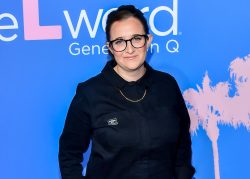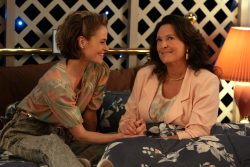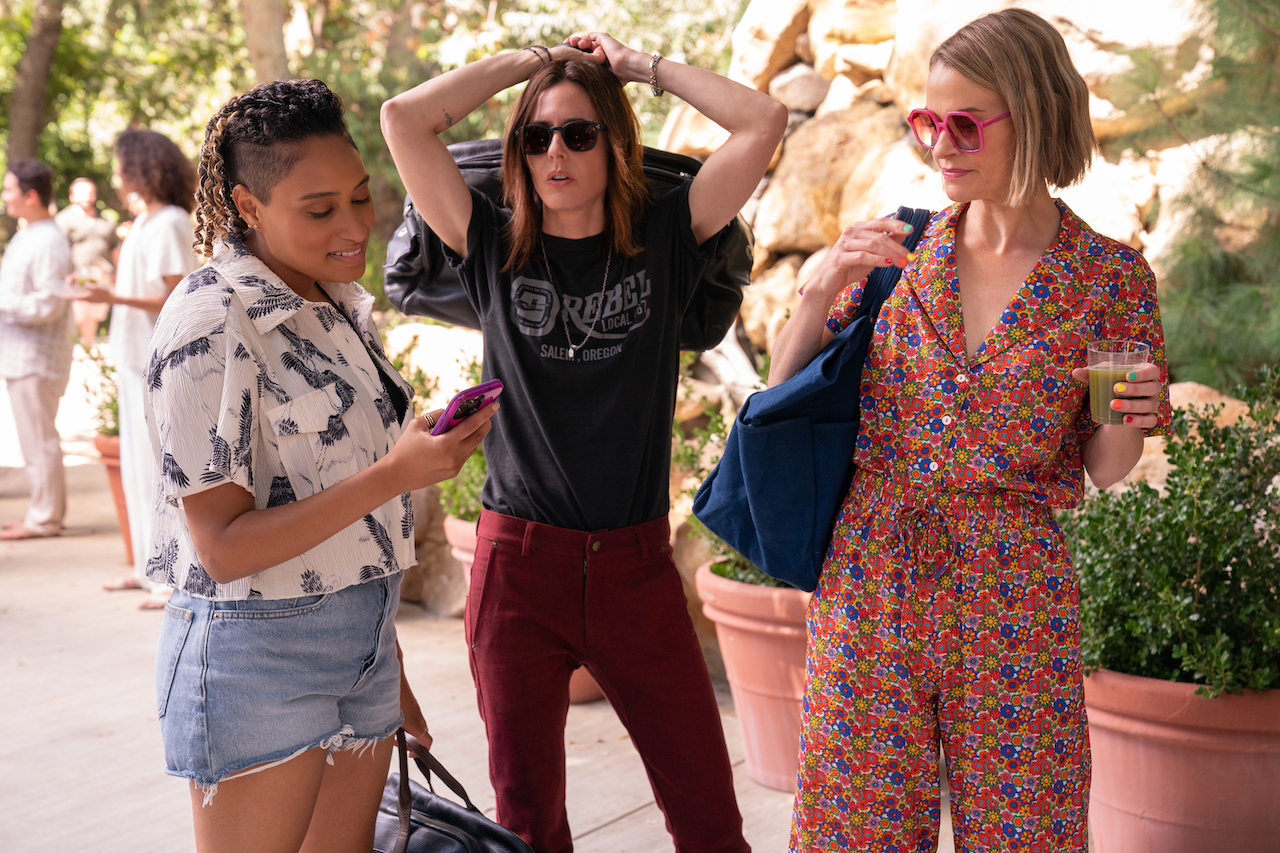The L Word originally appeared on Showtime in 2004 and lasted until 2009. The groundbreaking series that dealt with a group of gay women who grapple with love, loss, and their careers in the City of Angels. Created by Ilene Chaiken, Michele Abbott, and Kathy Greenberg, it starred Jennifer Beals, Leisha Hailey, Laurel Holloman, Mia Kirshner, and Pam Grier. However, there was a void in the television realm for a show that was like Sex and the City for queer women. That’s where Marja-Lewis Ryan stepped in.
Brooklyn native Marja-Lewis Ryan has given the show a fresh new perspective, while maintaining the heart and soul of the original. The L Word: Q Generation just had its third season on Showtime and she’s been the executive producer, showrunner, writer, creator, and director since its inception. When writing, her interest is always characters first, which is the perfect mindset for a show like The L Word: Q Generation, which has a strong ensemble cast that includes Jennifer Beals, Kate Moennig, Leisha Hailey, and Arienne Mandi.
Marja recently took the time to speak with Creative Screenwriting Magazine about her journey as a writer and with the show.
On Her Roots and Introduction to Writing
I’m from Brooklyn, New York and I grew up watching Broadway musicals. That was my entrance into our industry. I remember going to see Joseph and the Amazing Technicolor Dreamcoat when I was five years old and there’s a kid’s choir in it. I remember kids came running down the aisle and I remember thinking, ‘Oooh, man, they’re going to be in trouble! I know you’re not supposed to do that!’ Then they were lying on stage, and I knew what I was going to do forever.

Marja-Lewis Ryan. Photo by Michael Buckner/ SHOWTIME
I went to NYU as an actor. I studied at the Atlantic Theater Company’s Acting School. One of their primary lessons was to make your own work, so I started writing right around college, mostly because I hadn’t heard a lot of my own voice. I didn’t know how I was going to have a career, so I started writing as a way for me to act. I made my first movie, The Four-Faced Liar, when I was twenty-four years old. I moved to L.A. with my three best friends, and I wrote a play for us, hoping that we would get an agent as actors. It ran the LGBT circuit. It came out in 2010 and it looked really good. It looked like a movie.
Because of that, we got to sell it. We sold TV rights. No one does that anymore. It was fun. We sold to Netflix and Hulu when they were in their infancy. I learned a lot from that process. I’ve been making queer stuff on my own for a very long time. We made that play into a movie. I remember shooting that movie and the director kept asking me to raise the book higher. I remember thinking, ‘This isn’t the best of me. I think there’s a better place for me.’
My writer self comes from that actor place. I’m very much a character-first writer. My theater background and my acting background influences what I do tremendously.
On When Her Career Shifted
There was a moment where my career changed. I made the play into the movie. Then I made about a half a dozen plays. I put them up at a black box theater on Santa Monica Blvd. I won some stuff in the L.A. theater world. I was just using them as spaces to get good. I needed that live feedback that you get onstage with an audience. In 2014 I had this play, One in the Chamber. David Mamet came and saw that play. He asked me if I would direct a play of his. I directed a play of his in L.A. and New York. Russian director Timur Bekmambetov saw the play and loved it. He gave me a quarter of a million dollars to make this really weird indie movie. That was like the first time I ever really got paid to do something. It failed, but he’s awesome. He’d bet on me again.
On Getting Paid to Write
I didn’t get paid to write The Four-Faced Liar and I didn’t get paid to write the next thing. The first thing I was paid to write was a script for $4,000. I was so pumped. My manager found me a spot that would develop me internally. It was a paid lab. It was $4,000 for twelve weeks. I sold my first TV show in 2015. I think it was Splash. During that lab, I learned how to turn around work and fitting into a system. I had never outlined before. I was really raw. I knew nothing. But I understood the process of what the expectation is. I really like to make stuff.
On Rebooting The L-Word
My very first studio job, on the feature side, was writing an adaptation of Lean In, the Sheryl Sandberg self-help book. A bunch of women got together, and we all told our individual stories, and one writer wove them all together. In that room were seven other writers and one of them was Ilene Chaiken. I met Ilene in this one-week writers’ room at Tri-Star and I pulled her aside and told her, “I wouldn’t be here if it weren’t for you. I love you. Thank you. I’ll try not to embarrass myself.”

Alice (Leisha Hailey) & Dana (Erin Daniels) Photo by Nicole Wilder/ SHOWTIME
I was the youngest person in that room, and I’ve always thought the youngest person should do the most work. I was pitching my a** off in that room and I think that she just remembered me because I was so hungry. I have a real way in those spaces. Six months later I sent her an email because I saw her name on the end credits of The Hand Maid’s Tale. I told her, “Congratulations. The show’s awesome.” She emailed me back and said, “Do you want to come pitch on The L-Word?” They didn’t greenlight it from the jump. It was a whole process. I had to pitch for the project. Then I wrote a single script. Then they greenlit the first season, which was eight episodes.
My writing routine is always the same. I always start off with a character voice, which is pretty common for me. I hate to say I wake up with voices in my head, but I really do. These characters come to me, and their circumstances and stories build up from there. I’m a character first writer for sure. I think in the television and feature space sometime the IP is coming at you. If that’s the case, I tell my partners that we can reboot it, but the characters have to be mine. IF the characters aren’t mine, then I can’t write it.
On Maintaining or Changing the Original Characters from the Show
That was hard. A character that I think I did well, Alice, is one I related to in the original. She was always number five or number six in terms of story order. It felt like an opportunity for me. Her voice was really clean, but her stories were really limited. Basically, what I did was take the character that was already there and build story up around her. I really do feel she’s shining on this show. All things are collaborative, no one truly does anything alone. There are some parts of this show that are definitely my voice, then other times where I’m writing outside of my voice. Then there are other parts of my voice that I don’t get to exercise as regularly.
In the Writers’ Room for Three Seasons
I’ve had the best luck. I’ve had a very successful writers’ room all three seasons with writers who were moving the ball up the mountain. At no point have I had someone who’s resistant on the other end. When I talk to other writers, I know that that experience is not common. I don’t know of any other experiences because I’ve only run my own rooms and that’s how I run them. Those people showed up for me in such big ways. They shared their personal narratives in ways they don’t normally have to in a work environment.
The show represents a huge community. I think I got better at selecting writers as the seasons progressed because I became conscious of what I actually needed. I’m looking for balance in the writers I hire. I’m looking for two pitchers, comedy writers, and a true character development person. And then a story structure person. Then there’s me, I’m a leader. I know what comes next and can push and pull to get the best out of people to fill in the spaces. You want to make sure that 3/4 of your writers can actually write. I directed five episodes during the three seasons. I had a vision for the show coming in, but I had made one pilot at Amazon before I got this job. The most fun episode for me to direct was episode one of season two. I really came in to reset the tone of the show aesthetically. We went totally hand-held, totally lamp lit. I wanted to strip away some of the glossiness. I wanted to find myself a little more behind the camera. The first season felt a little objective. Season two, you’re in it from the jump.
I always want viewers to be able to see themselves on television and also laugh at our own pain. Our gayness doesn’t precede us. It’s a given that the show is gay, so you’re watching it for something else.
On the Difficulty of Writing Hetero Characters vs Queer
I think it’s harder to write queer characters because there aren’t enough examples and it’s hard to do what you don’t know. I’m really writing from the inside out, which really lacks perspective. For me, it’s harder to stand in my own shoes than in that guy’s.

